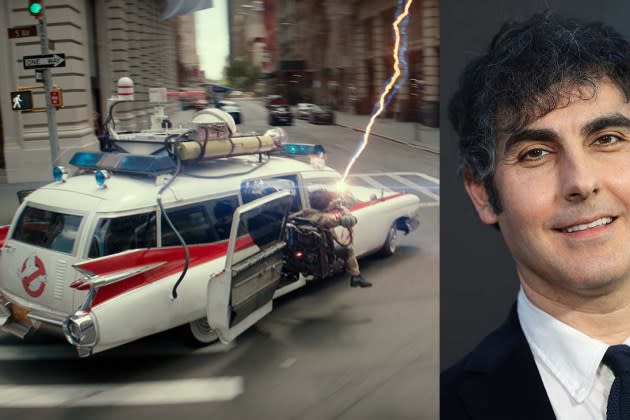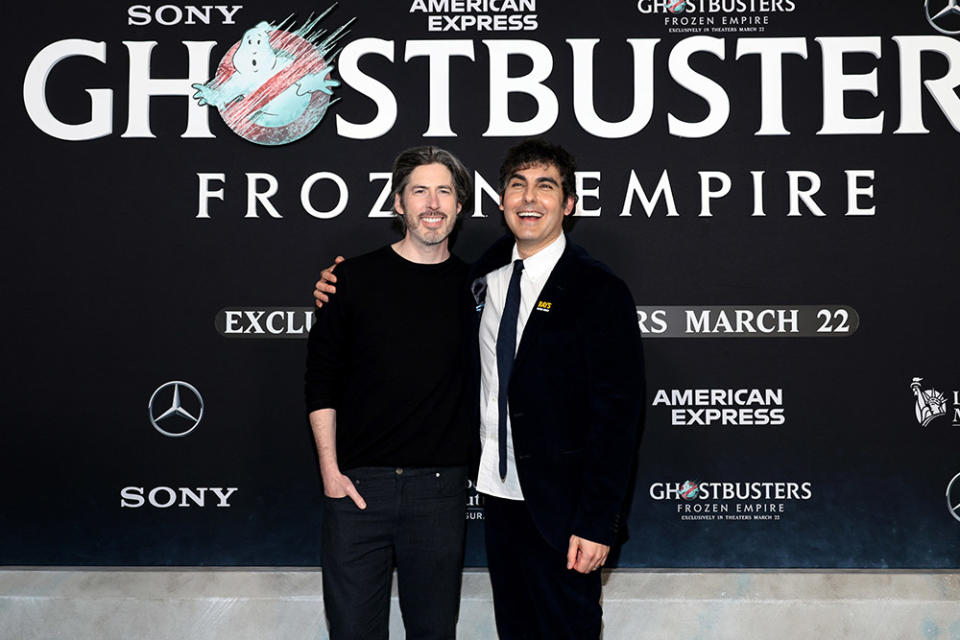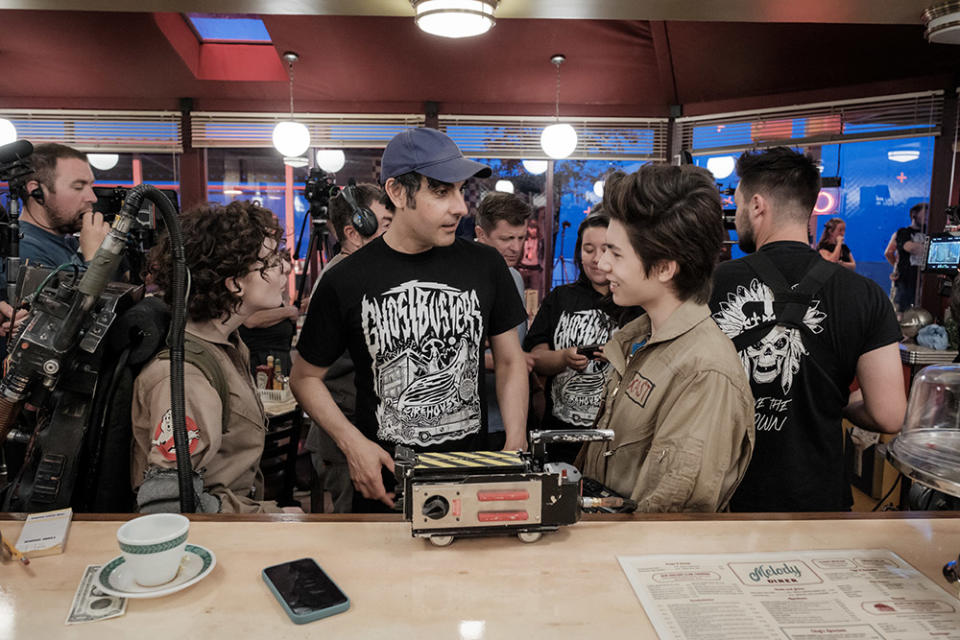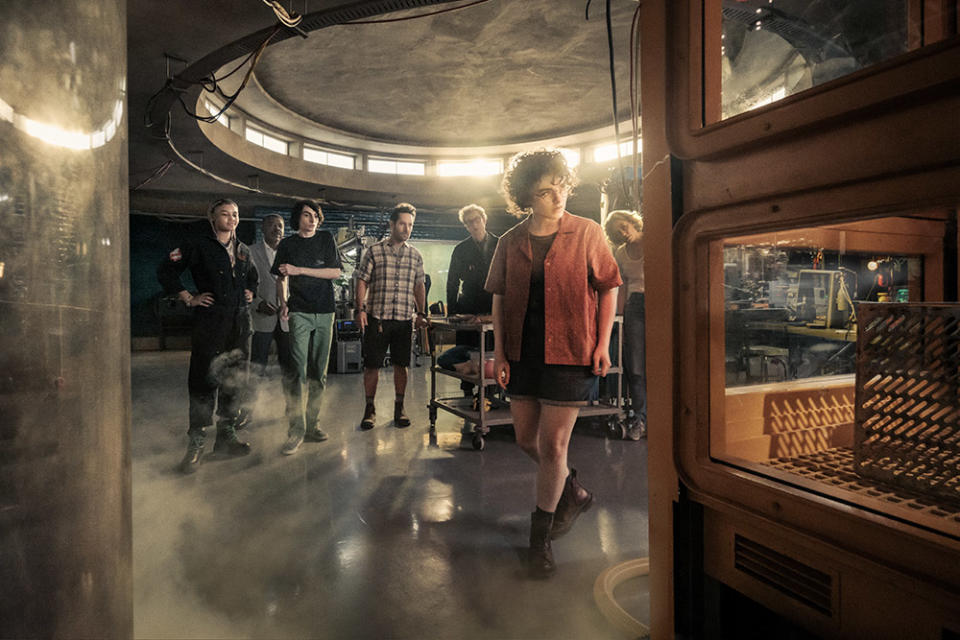‘Ghostbusters’ Director Gil Kenan on Taking the Reins From Jason Reitman and Sharing ‘Frozen Empire’ Story with Ivan Reitman

When Gil Kenan co-wrote Ghostbusters: Afterlife with his creative partner Jason Reitman, they knew full well that they were penning a touching tribute to Ghostbusters co-creator Harold Ramis and his character of Egon Spengler. Upon the release of Afterlife in November 2021, they ramped up their efforts to crack the story that would eventually become its sequel, Ghostbusters: Frozen Empire, however, just a few months later, another Ghostbusters co-creator, Ivan Reitman, passed away, turning Frozen Empire into an homage to the beloved filmmaker.
As it turned out, Kenan and Jason Reitman had the chance to share their Frozen Empire story outline with Ivan before he passed on.
More from The Hollywood Reporter
Colin Farrell's Penguin Returns in 'The Batman' Spinoff Trailer
'Ghostbusters: Frozen Empire' Warms Up Box Office With $4.7M in Previews
“We pitched an almost complete version of this film’s story outline to Ivan before his passing, and that was really meaningful,” Kenan tells The Hollywood Reporter. “Obviously, we didn’t know that he wouldn’t be with us for the film, but his validation of the pitch and his joy at hearing it was something that kept us going through the writing.”
Given how personal the Ghostbusters franchise is to the Reitman family, Jason eventually had to take a step back from directing Frozen Empire, and Kenan remains honored to have had the chance to follow in his and Ivan’s footsteps.
“It was an evolving conversation, and I’m obviously very grateful to Jason for entrusting me with his family’s franchise,” Kenan says. “But I’m also really grateful that I was able to have a front row seat to the profound passing of the torch that took place on Afterlife between Ivan and Jason.”
As far as what’s next for the franchise, Kenan hopes to give their current hero, Phoebe Spengler (Mckenna Grace), a trilogy capper, at the very least.
“If we’re lucky enough to get to tell another one of these films, Jason and I are primed and ready to continue the Phoebe Spengler saga,” Kenan shares. “We agree that the single most important decision we had to make at the start of this process was to take this from something that was a group of people who came together with a shared purpose, which was starting a business, to making it about a family saga with one character at the center of it. And that was Phoebe Spangler.”
Below, during a recent conversation with THR, Kenan also addresses whether Rick Moranis was ever approached about returning as Louis Tully, before explaining how his and Reitman’s next film, SNL 1975, has been in the works since before Afterlife got going.
Gil Kenan, congrats on Ghostbusters: Frozen Empire.
Thanks so much!
Did I pronounce your name right? Ken-in?
I say Ken-in, but I met Kenan Thompson last night and I didn’t have the heart to tell him that he’s been pronouncing it wrong all these years. (Laughs.) But I go by either pronunciation.
You’re already starting with the SNL references, I see. You’re foreshadowing where this interview is headed.
(Laughs.)

So you and Jason Reitman went from hockey buddies to writing partners? Is that your origin story?
Yeah, our illustrious history as hockey buddies lasted exactly one scrimmage match. It was only functional in that it was our meet-cute. Beyond that, we never went back to playing. It was a means to an end.
Jason had long been on the fence about making a Ghostbusters movie, but the story I heard is that you gave him the push he needed. Would you say that’s true?
I’ve never thought of it that way. I am a Ghostbusters superfan. I always have been. I saw the first film in 1984 when we first moved to Los Angeles. My dad took me to see it in Hollywood, and the movie totally blew my mind and made me fall in love with what a big Hollywood movie could do. But for years I have had the conversation with Jason about where he was in his own familial relationship with this film series at any given point. It was definitely an open conversation, and in me, his creative partner, he found somebody who was willing and eager to tell that story when he felt like it was time. And so it came about very organically. There was definitely no coaxing. It didn’t require any pushing. It was the right moment to do it, and the right story began to present itself to us through the way that most of our work happens: long conversations, sometimes walking, sometimes driving. It’s open-ended without setting boundaries to where the conversation can lead, and that’s how we’ve crafted all the stories we’ve written together. That’s why I think we work well together. It’s all grounded in love of film and really open communication.
Ghostbusters: Afterlife was obviously a very personal experience between Jason and Ivan Reitman. According to Jason, those individual scenes where Phoebe (Mckenna Grace) and Callie (Carrie Coon) explore Egon’s lab were partially meant to parallel his younger self on his dad’s movie sets. So in light of Ivan’s passing, it makes sense why he removed himself as director on Frozen Empire. Did he catch you off guard with the offer to take over, or did he baby-step his way to it?
I guess it was a little of both, but the truth is that both Jason and I approach our writing as filmmakers. Regardless of which one of us is directing a script that we’re writing, we sit down to write it like directors, and so it’s not like we take one hat off and put the other on. The conversation for me to take this one happened over time while we were writing this screenplay, and by the end, we were definitely shaping it in my direction. But it was an evolving conversation, and I’m obviously very grateful to Jason for entrusting me with his family’s franchise. But I’m also really grateful that I was able to have a front row seat to the profound passing of the torch that took place on Afterlife between Ivan and Jason. The level of pride and love that Ivan showed, and the screenings that I was lucky enough to attend with him and audiences around the world, there was a depth to the satisfaction and the pride that I experienced in those moments that was so special. And those are core elements that we carry forward into the Ghostbusters stories going forward, starting with Frozen Empire. In fact, we pitched an almost complete version of this film’s story outline to Ivan before his passing, and that was really meaningful. Obviously, we didn’t know that he wouldn’t be with us for the film, but his validation of the pitch and his joy at hearing it was something that kept us going through the writing.
Well, this is quite a segue, but Ray Parker Jr.’s infamous lyric, “Bustin’ makes me feel good,” has now been uttered in the Ghostbusters universe.
(Laughs.)
That means the song also exists in the fictional world as well. I just rewatched all the movies and I don’t recall it happening, but has the song ever been played diegetically?
I think this was the first, but it didn’t feel to me like it was breaking some sort of space-time continuum, because with Ghostbusters II, it became clear that the Ghostbusters were aware of the brand and were not above exploiting it for branding, marketing, franchising. So I think that it feels authentic. It feels natural. To exist in a world where they are hermetically sealed as just a single shingle for ghost extermination is not genuine after a 40-year span of being a part of New York City’s story. You would imagine that there would be a popular cultural influence. We even saw it in the montages in the first film where it was clear that they were making a mark on culture. So the fact that the song would be identified with their brand, and that our characters would be aware of it, felt like a slightly cheeky, but not out of the question, presumption.

Egon bailed on his family for a world-saving reason in hindsight, but it still caused untold damage. Oscar Barrett’s dad also bailed on him, as did Phoebe (Mckenna Grace) and Trevor’s (Finn Wolfhard) dad. What’s with all the bad dads in the Ghostbusters franchise?
(Laughs.) I think that it’s more about the characters who become prime candidates for Ghostbusters. They’re forged by being outsiders, and that has always been what makes a great Ghostbusting team. It’s a group of folks who find a shared community in each other where perhaps they don’t have it outside of the core group of Ghostbusters. That has been part of the DNA of what made that original outfit so special. Unfortunately, dads suck way more than moms historically, and it just so happens that we have characters who have that shared story. They share those obstacles and have to overcome them throughout their family stories. But I like to think that we’re equal opportunity parent haters in this franchise. (Laughs.) So there’s just as many examples of dads who stepped forward, and in this film, Gary Grooberson [Paul Rudd] has an arc that shows a dynamic of compassion and a willingness to engage, and I think it actually speaks volumes to the idea of dads being able to take center stage in a meaningful way in a child’s life.
Do you know where Oscar Barrett is?
We’ve got an idea.
Was an attempt made to lure Rick Moranis back as Louis Tully, especially since he was slated to return for a Honey, I Shrunk the Kids revival a few years ago?
That would be a Jason Reitman question. That was more of an Afterlife story. We never wrote a role for Louis Tully in Frozen Empire. We’ve got enough characters in this story. I love Tully by the way. I’m a huge Rick Moranis fan. Louis Tully was an indelible element of Ghostbusters. Dana Barrett is also one of my favorite characters in these films, but there was no story for Dana Barrett in Frozen Empire. But if we’re lucky enough to make more of these films, I would love for Dana to have more to do in these stories.
Finn Wolfhard just told me a little bit about this, but did conversations with Dan Aykroyd on Afterlife’s set spark the idea for SNL 1975?
No, we’ve been talking about Saturday Night Live for a long time. We started talking about Saturday Night Live before Afterlife ever came about. Jason and I have been lifelong Saturday Night Live fans, and in a lot of ways, SNL was my comedy school growing up. On Saturdays, I had SNL, and on Sundays, I had 120 minutes. That basically defined the entirety of my cultural upbringing as a teenager. Jason had the idea for a long time to tell a story about the beginning of that show, and it was only once he and I started to talk about it and research it that the potential scope and boundaries of what that project would be started to materialize. And then we embarked on a series of interviews and conversations, dozens of them, with every single living cast or crew member we could get our hands on. And we started to build together a narrative that just jumped off the page. We could not contain it, and writing that script was one of the most propulsive, almost spontaneous events, because we were so bursting with story by the time we got down to writing.

Phoebe Spengler is a special character, and she should at least have a proper trilogy. The mid-credits scene suggests that you know where you want to go, but how far ahead are you on a potential third story?
Well, like we did in Afterlife, we had a sense of where we wanted to see our characters go and what scope of stakes we wanted them to have to confront. But we left a lot of invention to the actual act of writing. So much of the joy for us is sitting down with a blank sheet of paper and beginning to imagine. And if we’re lucky enough to get to tell another one of these films, Jason and I are primed and ready to continue the Phoebe Spengler saga. We agree that the single most important decision we had to make at the start of this process was to take this from something that was a group of people who came together with a shared purpose, which was starting a business, to making it about a family saga with one character at the center of it. And that was Phoebe Spangler. So watching her character mature in lockstep with Mckenna as a young performer is one of the joys of telling a story that spans years. In real time, we’re seeing her and her character mature, and that means that the obstacles and the personal stakes mature and develop in equal measure. It’s a really fun way to tell a story because it feels like it is growing in front of your eyes, and so we’re hoping we get to tell the rest of that story.
***
Ghostbusters: Frozen Empire is now playing in movie theaters.
Best of The Hollywood Reporter

 Yahoo News
Yahoo News 
